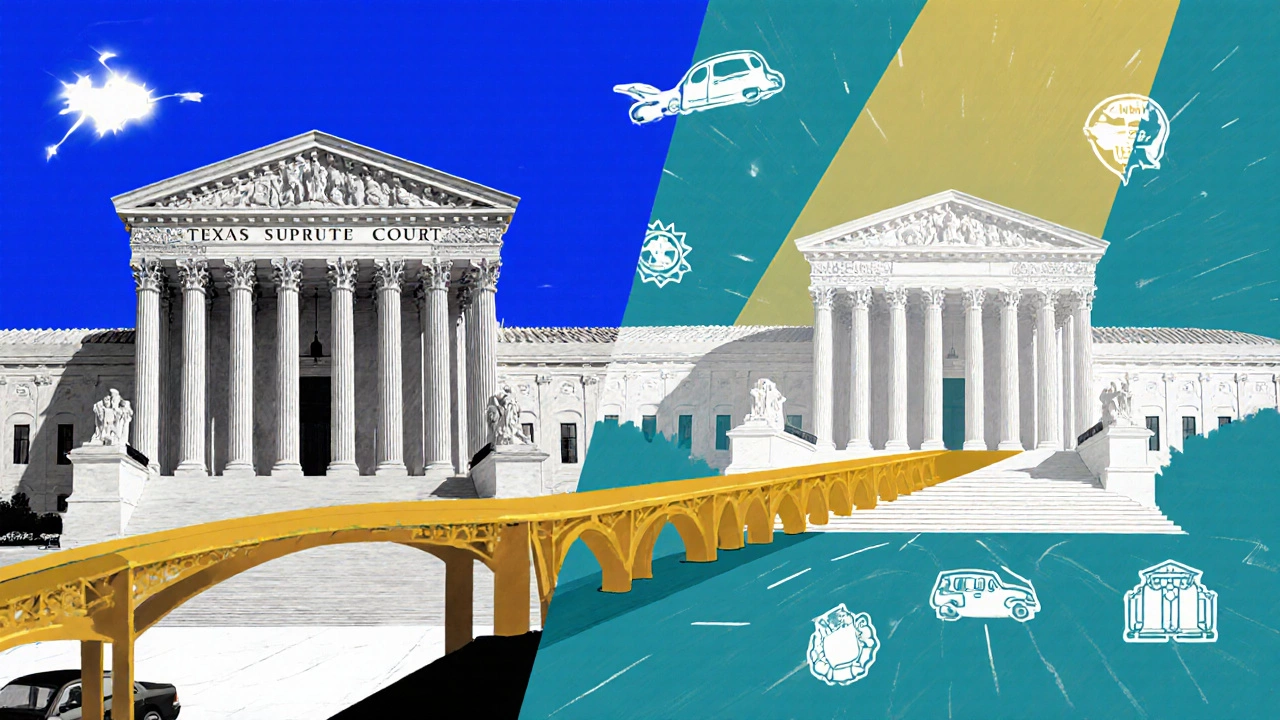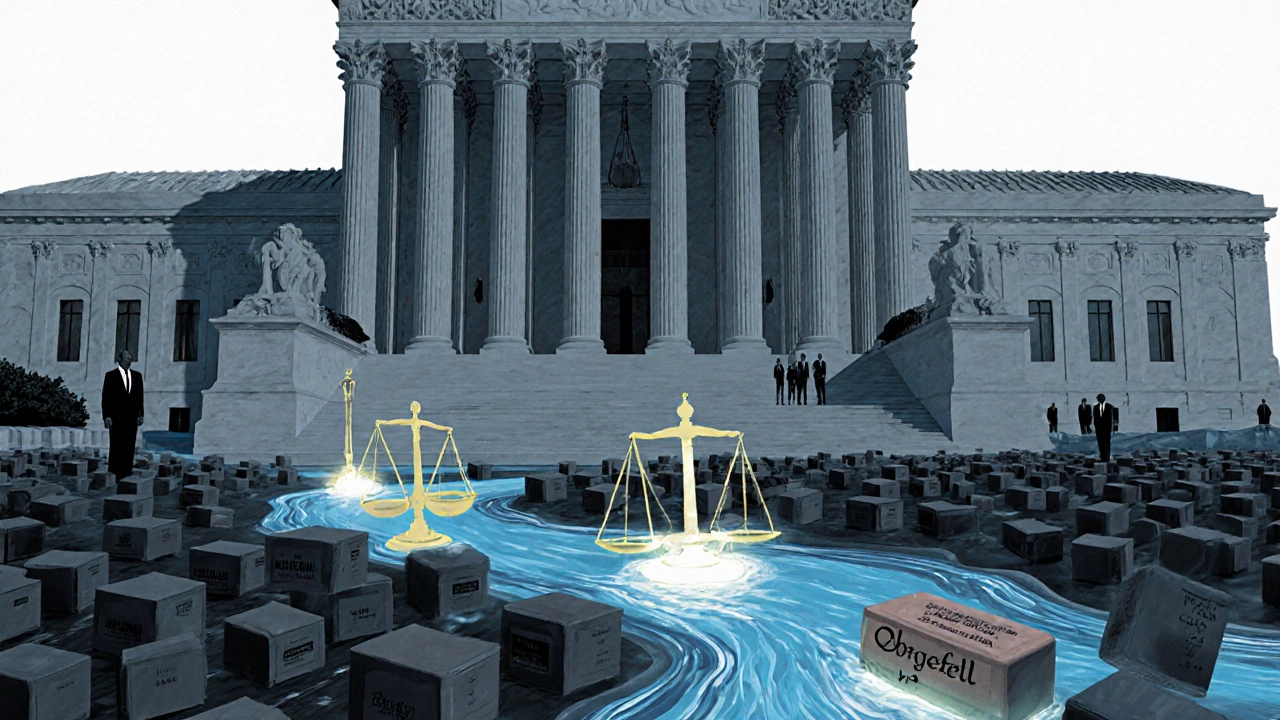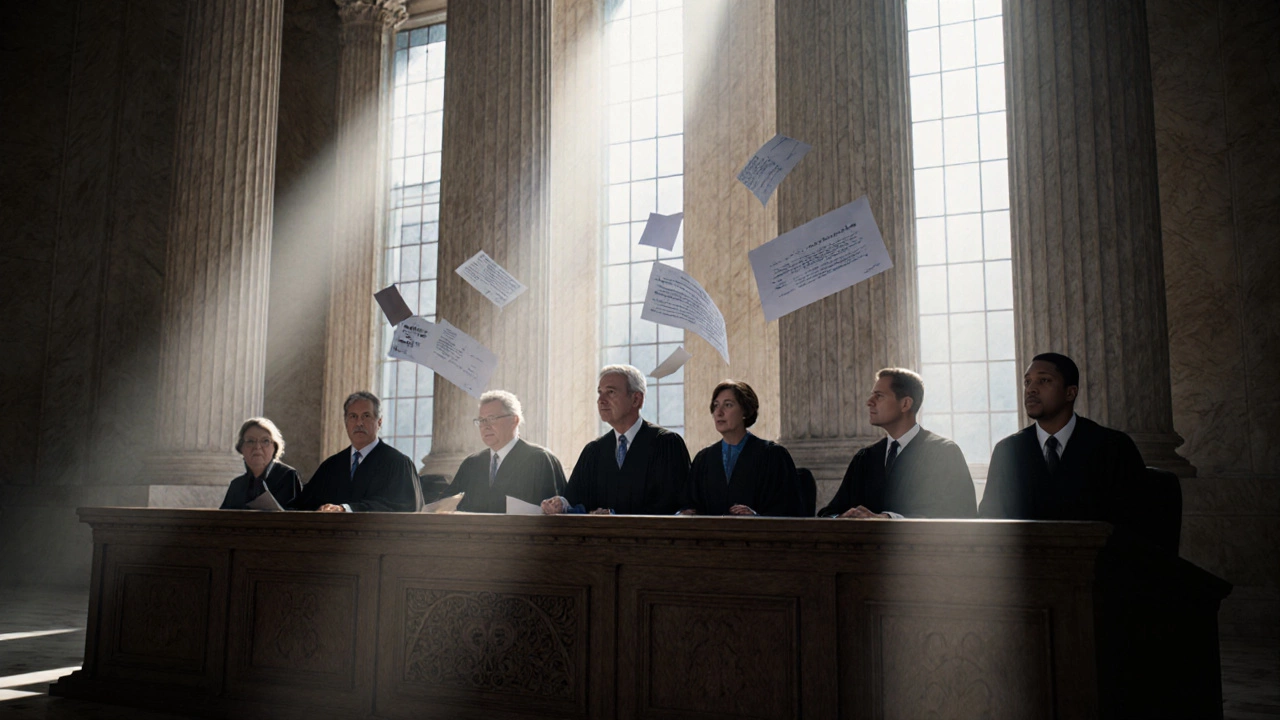Supreme Court Eligibility Checker
Does Your Case Reach the Supreme Court?
This tool helps determine if your case could potentially reach the U.S. Supreme Court based on the article's criteria. Remember: The Supreme Court only hears about 1% of cases that come before it.
When a case reaches the end of the road in lower courts, people often wonder: what is the highest court a case can go to? The answer isn’t the same everywhere - it depends on where you live and what kind of case you’re dealing with. But in the United States, the final stop for almost all legal disputes is the Supreme Court of the United States.
The Supreme Court Is the Final Authority
The Supreme Court of the United States is the highest court in the federal judicial system. It doesn’t hear every case that comes its way. In fact, it only takes about 1% of the 7,000 petitions it receives each year. But when it does take a case, its decision is final. No other court can overturn it. That includes appeals courts, district courts, or even state supreme courts.
This doesn’t mean every case automatically goes there. Most cases end at the state level. If you’re suing someone over a broken contract in California, and the state supreme court rules against you, that’s usually the end. Unless your case involves a federal law, the U.S. Constitution, or a conflict between states, the Supreme Court won’t step in.
When Does a Case Reach the Supreme Court?
A case can get to the Supreme Court in two main ways. The first is through a writ of certiorari - that’s a fancy term for asking the Court to review a lower court’s decision. The Court picks cases that have national importance, clear legal conflicts between different courts, or big constitutional questions. For example, cases about abortion rights, voting laws, or free speech often make the cut.
The second way is if the case starts in a federal court and goes all the way up through the appeals system. Federal cases begin in district courts, then move to circuit courts of appeals, and finally to the Supreme Court. If the circuit courts disagree on how to interpret a federal law, the Supreme Court may step in to settle the conflict.
It’s important to know: the Supreme Court doesn’t retry cases. It doesn’t hear witnesses or look at new evidence. It only reviews the legal arguments and decides whether the lower court applied the law correctly.
State Supreme Courts Are the Top in Their Systems
Not every case goes to Washington, D.C. Most people will never set foot in a federal courtroom. If your case is about a car accident, a divorce, or a landlord-tenant dispute, it’s likely handled entirely within your state’s court system.
Each state has its own supreme court - the highest court in that state. In Texas, it’s the Texas Supreme Court. In New York, it’s the New York Court of Appeals (yes, that’s its official name). These courts have final say on state laws and state constitutions. Their rulings can’t be appealed to the U.S. Supreme Court unless they involve a federal issue.
For example, if a state supreme court rules that a law banning certain protest signs violates the state constitution, that’s the end of the line - unless the U.S. Supreme Court decides the ruling also breaks the U.S. Constitution. Then, and only then, can the case move up.
What About International Courts?
You might hear about the International Court of Justice or the International Criminal Court. But these don’t override U.S. courts. The U.S. doesn’t recognize international courts as having authority over its citizens in domestic matters. A murder case in Florida? That’s handled by Florida courts. Even if the crime has global implications, like terrorism, the U.S. Supreme Court still has the final word under American law.
There are rare exceptions. If the U.S. signs a treaty and Congress passes a law to enforce it, then international law can influence U.S. courts. But even then, the Supreme Court still has the last say on how that treaty applies inside the country.

Why Doesn’t Everyone Get to Appeal to the Supreme Court?
The Supreme Court isn’t designed to fix every mistake. It’s meant to resolve big legal questions that affect the whole country. If you lost your case because a judge misread a state traffic law, that’s not something the Supreme Court will fix. They’re not a safety net for bad outcomes - they’re a filter for legal uncertainty.
Think of it like this: Lower courts handle the daily cases. Appeals courts fix clear errors. The Supreme Court only steps in when the rules themselves are unclear or conflicting. That’s why you need a lawyer who understands not just your case, but the legal principles behind it. A good attorney will tell you early on whether your case has a shot at the Supreme Court - and most of the time, the answer is no.
What Happens After the Supreme Court Rules?
Once the Supreme Court issues its decision, it’s binding on all lower courts. That means every judge in the country must follow it. If a state court tries to ignore a Supreme Court ruling, the federal government can step in. For example, after the Supreme Court ruled in 1954 that school segregation was unconstitutional, states couldn’t continue to run separate schools - even if they wanted to.
The ruling becomes part of the legal landscape. Future cases will cite it. Lawyers will use it to argue new cases. Politicians may try to change the law to work around it. But they can’t undo it. The only way to reverse a Supreme Court decision is through a constitutional amendment - which is extremely rare. The last time it happened was in 1971, when the 26th Amendment lowered the voting age to 18, overriding a previous ruling.
Can the President or Congress Overrule the Supreme Court?
No. The President can’t ignore a Supreme Court ruling. Congress can’t pass a law that directly contradicts it. The system is built on checks and balances, but the Court’s interpretation of the Constitution is final. The only tools they have are indirect: Congress can change the number of justices, or pass new laws that respond to a ruling without directly overturning it. For example, after the Supreme Court limited campaign spending in 2010, Congress tried to pass disclosure laws to increase transparency - but couldn’t ban the spending itself.
That’s why Supreme Court appointments matter so much. One justice can shift the balance on issues like abortion, gun rights, or privacy. Their decisions last decades - longer than any president’s term.

Real Examples of Cases That Reached the Top
Some landmark cases show how this works in practice:
- Obergefell v. Hodges (2015): The Supreme Court ruled same-sex couples have a constitutional right to marry. Before this, some states banned it. After, all states had to allow it.
- Roe v. Wade (1973): Established a constitutional right to abortion. It was overturned in 2022 by Dobbs v. Jackson Women’s Health Organization, which returned the power to regulate abortion to the states.
- Brown v. Board of Education (1954): Ended legal segregation in public schools. This decision forced changes across the entire country.
These weren’t just legal wins - they changed how millions of Americans live. But they only happened because the Supreme Court chose to hear them.
What If You Lose in the Supreme Court?
If the Supreme Court rules against you, your legal options are nearly gone. You can’t appeal again. You can’t ask for a rehearing unless there’s a major error - and even then, it’s rare. You might try to get Congress to pass a new law, or push for a constitutional amendment. But those take years, and they’re not guaranteed.
Some people turn to public pressure - protests, media campaigns, lobbying. That’s how social change happens. But legally speaking, the case is over. The decision stands.
Bottom Line: The Supreme Court Is the Final Stop
So, what is the highest court a case can go to? In the United States, it’s the Supreme Court - but only if your case involves federal law or the Constitution. For most people, the state supreme court is the end of the line. The path to the top is narrow, selective, and rarely about who’s right or wrong in the moment. It’s about who’s right under the law - and whether that law applies the same way everywhere.
If you’re fighting a legal battle and wondering if you can take it all the way to the top, ask your lawyer: Does this case raise a federal question? Is there a split in how courts are interpreting the law? If the answer is no, then your case likely ends sooner than you think. But if the answer is yes - then you might be part of something bigger than just your case.
Can a case go to the Supreme Court from a state court?
Yes, but only if the case involves a federal law, the U.S. Constitution, or a conflict between states. State supreme courts have final authority over state law, but if their ruling touches on federal rights, the U.S. Supreme Court can review it.
How many cases does the Supreme Court hear each year?
The Supreme Court receives about 7,000 petitions each year but only hears between 60 and 80 cases. It picks cases that have national importance, resolve legal conflicts, or clarify constitutional questions.
Can the President ignore a Supreme Court ruling?
No. The President must enforce Supreme Court decisions, even if they disagree. The Court has no police force, but its rulings are binding under the Constitution. Ignoring them risks constitutional crisis and federal intervention.
Is the Supreme Court the highest court in all countries?
No. Each country has its own highest court. In the UK, it’s the Supreme Court of the United Kingdom. In Canada, it’s the Supreme Court of Canada. The U.S. Supreme Court only has authority within the United States.
Can Congress change the number of Supreme Court justices?
Yes. The Constitution doesn’t specify how many justices there should be. Congress has changed the number several times in history - from six to ten - and currently sets it at nine. This is called court-packing when done for political reasons.
What’s the difference between a state supreme court and the U.S. Supreme Court?
A state supreme court is the final authority on state laws and state constitutions. The U.S. Supreme Court is the final authority on federal laws and the U.S. Constitution. A state court’s ruling can only be appealed to the U.S. Supreme Court if a federal issue is involved.
